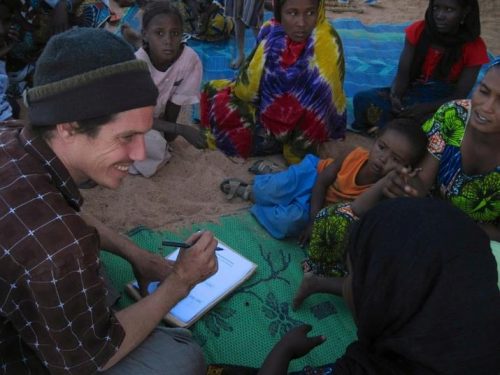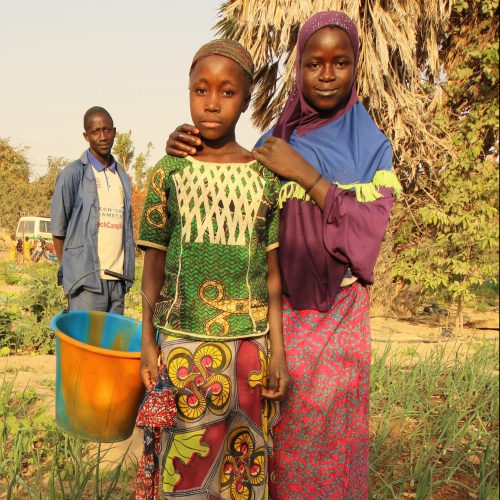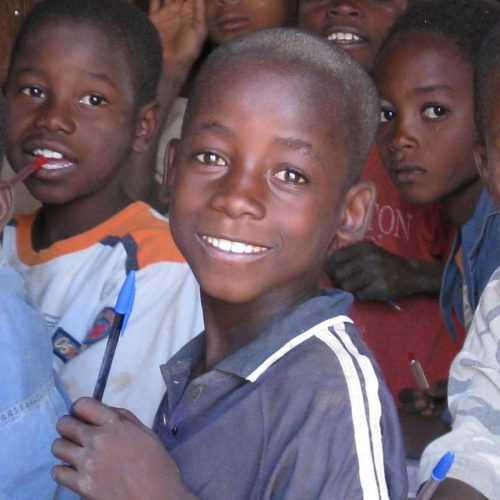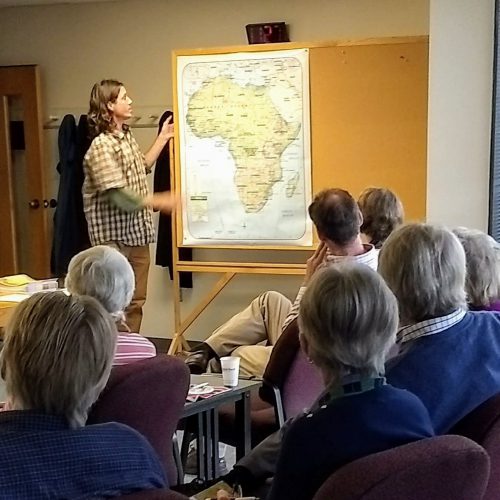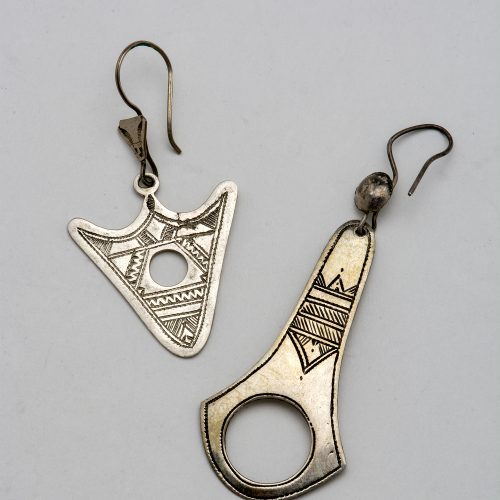Brian “Barke” Nowak passed away in November. Brian was a former RAIN Director of Programs, devoted advocate of Niger, and a beloved friend. As a way to remember and honor him, we’d like to share a few words from some of the many people who were lucky enough to know him.
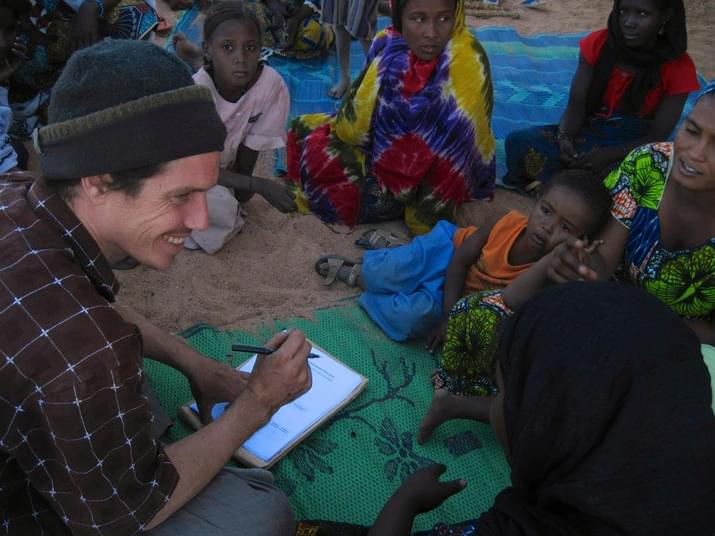
Bess Palmisciano, founder of Rain for the Sahel and Sahara
Brian “Barke´ Nowak: MemoriesIt is both difficult and joyful to write about my dear friend and RAIN compatriot, Brian Nowak. He is known in Niger as Barké, Djarma for blessings. The name was given to him when he joined the Boston University semester abroad program in Niger. When he saw the BU catalog offerings for a semester abroad he chose Niger because he’d never heard of it. I think he was the only BU student to enlist in 3 consecutive semesters abroad in Niger.
After completing his BA and MA degrees and teaching in the Brooklyn, he returned to Niger. While an excellent teacher, it was anthropology that lived in his heart. He was devoted to the indigenous peoples of Niger, and especially the peoples of the Tillaberi region with whom he spent many of his weekends. The affection and respect was reciprocal; he was invited to traditional ceremonies normally closed to outsiders. That was the key — Barké did not approach as an outsider, but as a human.
I met Barké soon after RAIN was formed in 2001. He was New York talkative, bursting with energy. Barké expressed views similar to that of anthropologist Paul Stoller who said: “I opened my experience–my joy and pain and that of my Nigerien friends–to them and such an opening established a connection.’ Attaining a deep connection with Nigerien people living traditional lifestyles was one of Barké’s innate talents — enhanced by his fluency in Djarma, a dominant language in the Tillabery region.
Barké and I shared ideas about community development and education. He worked as a consultant and translator with a number of larger organisations but, luckily for us, RAIN did steal us full time. His presence was a giant step forward for us.
His talent for connection, in addition to his experience as a teacher, was crucial in defining Rain’s approach to community development. Barké and I shared a vision of RAIN’S focused on valuing local traditions while introducing new ideas, discussing options, forming consensus. Here, Barké’s natural charm factor flourished. He coddled babies, played with children, connected with every person involved in a project. He eagerly ate local food, danced, sang. Whatever was happening, he was there.
His ground level talent was more than matched by his intellect. His curricula for adult literacy classes were unconventional, participatory and wildly successful. Some students had never held a pencil, others didn’t know that their language could be written. Classes were held in straw structures; passersby often stopped to listen and asked to join.
RAIN’S first women’s community garden cooperative had 90 members. Each woman had her own plot; water and composting pits were shared. Our agriculture specialist installed the garden and taught technique. Barké spent hours not just monitoring the work, but slinging babies over his shoulder and singing to them so mom could garden undisturbed. Barké taught basic nutrition, graphically showing the nutrients supplied by each vegetable in the garden. Halima Boubacar worked with him, modelling methods for incorporating vegetables into traditional cooking. Children, often on the brink of malnourishment, were weighed as a measure of improved nutrition.
Through the years, RAIN expanded its reach in the Tillabery and Agadez regions. Barké was instrumental in establishing and overseeing programming at The Agadez Learning Center. His touch is evident in all RAIN programs. The most I can hope for RAIN in the future is for Barké Nowak’s and my dedication to education, as well as our shared love of, and respect for, indigenous peoples will always guide Rain’s community partnerships.
Katherine Kolios, Executive Director, Rain for the Sahel and Sahara
Dear RAIN friends,
Before I ever stepped foot in RAIN’s US office, I flew to Niger to meet the team there. I arrived in Niger alone, knowing no one, and hoping for the best. The best arrived in the form of Brian.
As I exited the Niamey airport, I spotted him – instantly identifiable, towering over the crowd with his flowing brown hair, his classic orange sweater, and, of course, plastic sandals. From then on out, Brian was the one to pick me up and drop me off at the airport. He introduced me to Niger and to all the best places to get vegetarian street food in Agadez.
Together, we had Landcruiser breakdowns, we slept on mats under the stars, and I learned from him – about RAIN, about Niger, and about how to live a life devoted to building community.
Brian lived in Niger for over 15 years – working with RAIN for more than 8 years, including serving as RAIN’s longtime Director of Programs, consulting with international NGOs and research institutions, and adventuring to remote communities to conduct his own research with a focus on music and on animism.
In later years, as travel to remote communities became more difficult, Brian continued to enjoy spending quality time with students at the Agadez Learning Center – screening documentaries and organizing music and dance parties. Brian was fluent in Zarma and had an ease of communication (that extended far beyond his fluency in the language) with our colleagues and with the Nigeriens in the communities RAIN served.
Brian lived deeply and this loss will be felt far and wide. Brian leaves behind an incredible legacy. I and all of us at RAIN are grateful for his passion, his dedication, and his friendship.
Our condolences go out to Brian’s family, friends, colleagues, and all those who knew and loved him.
RAIN will continue to find ways to celebrate Brian’s life and honor his legacy. As those plans evolve, we will let you know how you can participate.
With gratitude for the time we had with Brian and in acknowledgment of the extraordinary impact he had on those who knew him – including countless Nigeriens and, as far as I can tell, just about every American to have traveled through Niamey in the last decade.
With love and appreciation for time spent, stories shared, and lessons learned,
Katherine Kolios
John Hutchison, Emeritus Professor of African Languages & Linguists, Boston University
Thoughts about Brian
Some people go to Africa as Peace Corps Volunteers and come to love Africa so much that they stay. We can think of several people in this category: In Senegal for example, there were Molly Melching, Sonja Fagerberg Diallo, and Gary Engelberg. Of course, we also think of our own Susan Rosenfeld who served in Senegal, came to Niger in 1983, and stayed for the rest of her life. Brian Nowak was also one, with this distinguished company. He was an alumnus of BU’s Niger Study Abroad Program, who decided to make his life in Niger, building his own home there and creating a life dedicated to the people of Niger.
Brian and Susan were close friends. If you were staying with Susan in 2015 or so, then you would some days wake up in the morning to the sound of their voices. Brian would stop by, and they would start their day with a morning meeting, sharing ideas and conversation about their various projects and activities.
Brian and I crossed paths many times over the years in Niger; we were both involved with RAIN and the Friends of Niger, etc.. But most recently we have been collaborating to enrich the African Language Materials Archive (ALMA). Some of you know, ALMA is an important repository for materials in African languages, with the mission of producing reading materials to attract Africans to become literate in their own languages, as well as providing materials on a website for students and scholars everywhere.
Brian had a deep love for and appreciation of the music of West Africa. He traveled widely filming and documenting African musicians. He would get to know the musicians and would film and record their music. He would contact linguists at local universities, and hire them to transcribe and translate the recordings. Brian became a seasoned ethnomusicologist. He recognized that the lyrics of music and song could become reading materials for our ALMA site. He also appreciated that much of the traditional music within this region is “endangered” just as the languages are, by neocolonialism, globalization and change. ALMA serves an important archiving function to preserve what may be threatened. Through his work, Brian became one of the most prolific contributors to the ALMA website. He was recently invited to join the Advisory Board of ALMA.
When we met him in our home during his recent visit, he and I envisioned a greater role for him as a Field Researcher for ALMA with the possibility of his traveling also to other regions on the continent, collecting and filming African music. When we last met, we discussed ways in which we might obtain grant funding for this work, while continuing his collaboration with ALMA and others. There were so many possibilities ahead for Brian, perhaps even becoming a Research Associate of the BU African Studies Center as a way to collaborate with ALMA and the African Studies Center in applying for grants.
Brian went to Niger, made a life and a career out of his contact with Nigeriens. He was loved in Niger. His life is now an amazing unforgettable story. In his short life, Brian effortlessly made many significant contributions to this troubled world of ours, a bright light. He was gifted, creative, talented, and dedicated. He is sorely missed.
Barbara Mehren Freeman, RAIN Board of Directors
Brian Nowak was one of the major reasons I became a supporter of Rain. His knowledge of the rural and nomadic peoples of Niger and their cultures was foundational to Rain’s work and inspired trust in Rain’s programs. Trust shared by donors and Nigeriens alike.
The time I spent with Brian and Bess in Niger are indelible memories. Brian spoke fluent Zarma, always surprising to the Nigeriens who didn’t know him. Shared language allowed shared experiences and relationships. He was loved by the communities that he served. He listened. He responded to their concerns and he made them the center of their own futures. They chose their own solutions and Brian helped to implement them. Brian not only respected the communities’ cultures, he absorbed them as if they were his own.
Brian’s being: his huge smile, intense blue eyes, willingness to be open and accepting, endeared him to all who knew him (he was a wicked tende dancer!). If the world were full of people like Brian we would have no poverty, we would accept all human diversity and we would have peace. Humanity has been robbed of an irreplaceable force for good with his death. We are heartbroken.
Cynthia Becker, Associate Professor, History of Art & Architecture Department, Boston University
It is with a heavy heart that the African Studies Center announces the unexpected passing of our friend and colleague, Brian (“Barké”) Nowak in November of 2021. Brian was an independent scholar and consultant based in Niger, with a passion for anthropology, ethnomusicology, development, and education. He lived, travelled, and worked in Niger for more than 15 years, including teaching for the Boston University study abroad program and consulting for field research and assessment projects. He was Programs Director for the NGO Rain for the Sahel and Sahara, and a research consultant and contributor to the African Language Materials Archive. At the time of his passing, he was in the process of establishing a formal appointment as Research Affiliate of the African Studies Center.
Brian was given the Fulani name Barké when attending the BU study abroad program in 1998. Brian stayed for three semesters, reluctantly returning to the US for the spring semester of 2000 to take the one course required for graduating with a BA in Anthropology and a Minor in African Studies at BU. He stayed in the US for another five years, completing his MA in General and Urban Education at Long Island University in New York while working as a teacher in NYC Public School 155, located in Brownsville, Brooklyn. As an elementary school teacher, he taught ESL, kids with special needs, and received a grant to implement a multi-cultural music program. Music, education, and language guided his teaching in NYC and these were the passions that Barké continued to cultivate his entire life. An intense longing for Niger led him to return permanently in 2005 when he began working as a consultant for the Red Cross and Red Crescent. When I met him in 2007, he had purchased some land near the Niger River in the Goudel neighborhood of Niamey and built an adobe house. We quickly realized our shared interest in divination, spirit possession, music, and art. He brought me to visit his favorite diviner, Issaka, translating with great ease from Zarma to English. Riding back in his Land Cruiser we stopped to eat street food; I was impressed to see the astonished looks on people’s faces when he spoke fluent Zarma. He comfortably teased and joked with people; his laugh was infectious and he managed to get everyone to smile and laugh with him.
Many of the BU students who studied in Niger had similar experiences to mine. Barké taught courses on Nigerien culture and performing arts. He coordinated field trips outside of Niamey, taking students to rural markets and sharing his intense love of Niger with them. When I returned to Niger in 2009, Brian and I traveled into the Liptako region to learn about Bella/Iklan communities there. Given that the area had no hotels, and even if it did Brian would not want to stay in them, he prepared for our journey by strapping mats on top of his car; we filled the back of his car with a large sack of rice, spices, onions, and a few other vegetables. We went to various market towns, interviewing blacksmiths, tailors, and women about styles of dress and social change in the region in regards to the history of slavery. When we visited small communities, we gave people some of the food and asked them to cook for us, sharing it with them. We camped by their homes and slept under the stars on our mats. We got stuck in the mud several times, once for a harrowing four hours; only a large truck and a team of people managed to pull us out. It was during this trip that we did the research that would be the foundation of an article we co-wrote for the journal African Arts, which will be published in September of 2022.
Security concerns in Liptako cut short our plans to write about Wogo painted houses on the Niger River islands near Ayerou. I found an email from several years ago where I told Brian that I was not going to have time to come to Niger that year, as I was working on a new project in Morocco. I regret that decision and every chance that I missed to travel with him, despite the fact that his car often broke down in the middle of our journeys. We had great adventures over the years traveling to Maradi and Zinder in eastern Niger and to Morocco together. When he came to the US once or twice a year, he stayed with me in Boston, giving at least a dozen lectures to my various African art classes. I teased him about wearing his yellow plastic sandals with socks to BU and often had to reprimand him for using the F-word during class or making some other off-color joke. Of course, students loved him.
But I was only one among many whose lives were impacted by Brian. He remained close to his host father from his study abroad days, Baba Nzara, whose family he regularly visited for Eid and other occasions. He was a devoted advocate for youth education, especially among children living in poverty, and supported several Nigerien students with school fees. He was a consultant for the music label Sublime Frequencies, traveling to Benin, Burkina Faso, Mali, and Nigeria with Hisham Mayet to document music and dance. He worked with his longtime friend Tara Deubel as a consultant for OXFAM in northwestern Mali. He taught with Cezarina Trone at the American International School of Niamey. He shared his great love of Tuareg music with Eric Schmidt and became good friends with scholars Scott Youngstedt and Sara Beth Keough. He was close to Sue Rosenfeld, who directed the BU study abroad program in Niger until it closed in 2011 and who lived in Niamey until her passing last year. For more than eight years he worked with Bess Palmisciano for the NGO Rain for the Sahel and Sahara as an organic gardening consultant, providing practical training in nutrition and health. This led to his position as a Programs Director for Rain, evaluating programs in agriculture and education, working on a dorm program for students from nomadic communities, and designing curricula. He maintained close friendships with his Rain colleagues, including Halima Aboubacar, with whom he collaborated on humanitarian work across the Tillabéri and Agadez regions. Every American who passed through Niger doing research or as a student encountered Barké. No doubt there are many others not mentioned here who would agree that he had a profound impact on their lives.
Over the last few years, Barké began to devote himself to his true passion: music and oral traditions. He worked with John Hutchison and traveled throughout the Sahel and documented more than 77 artists performing in 22 different languages. He was a talented photographer, often choosing to photograph people from below, presenting them as majestic and proud, which is clearly the way he understood them to be. An avid hiker, he loved spending the night under the stars, whether it was in northern Ghana or on the roof of his house in Niger. Barké was deeply spiritual and a seeker of knowledge, facing life with an open heart and mind. While he had many lifelong friends, he also valued his time away from people…as a solo traveler hiking for several weeks across the Adirondacks or driving into rural Togo to meet a diviner. I used to call him the most social hermit that I had ever met. Brian Nowak was a loyal friend, a talented educator, a generous humanitarian, and an avid adventurer who lived life according to his own terms. It was a joy to have him in my life but 14 years was not enough. I will miss him. Rest in peace Barké.
Mohamed Djingo, Minister Counselor, Security Council Affairs, Permanent Mission of the Republic of Niger to the UN
Brian was more than a colleague to all of us at RAIN, he was family. He was always the most humble and kind person in the room. He was our star at RAIN. I called him Mr. Mayor because there would always be at least one person who would say his name, everywhere we’d go.
While in Niamey, I shared the same office with him. I still remember him shouting at his laptop in Zarma when the internet connection won’t let him send his 10 pages emails. Brian was also my Zarma teacher, he would always teach me words he learned from his trips to the many villages and share interesting stories and pictures.
I am also sharing this picture I took of him in 2017, as he was preparing to go on a field trip. This is the smiling and dedicated face I will forever cherish.
I will miss you, Brian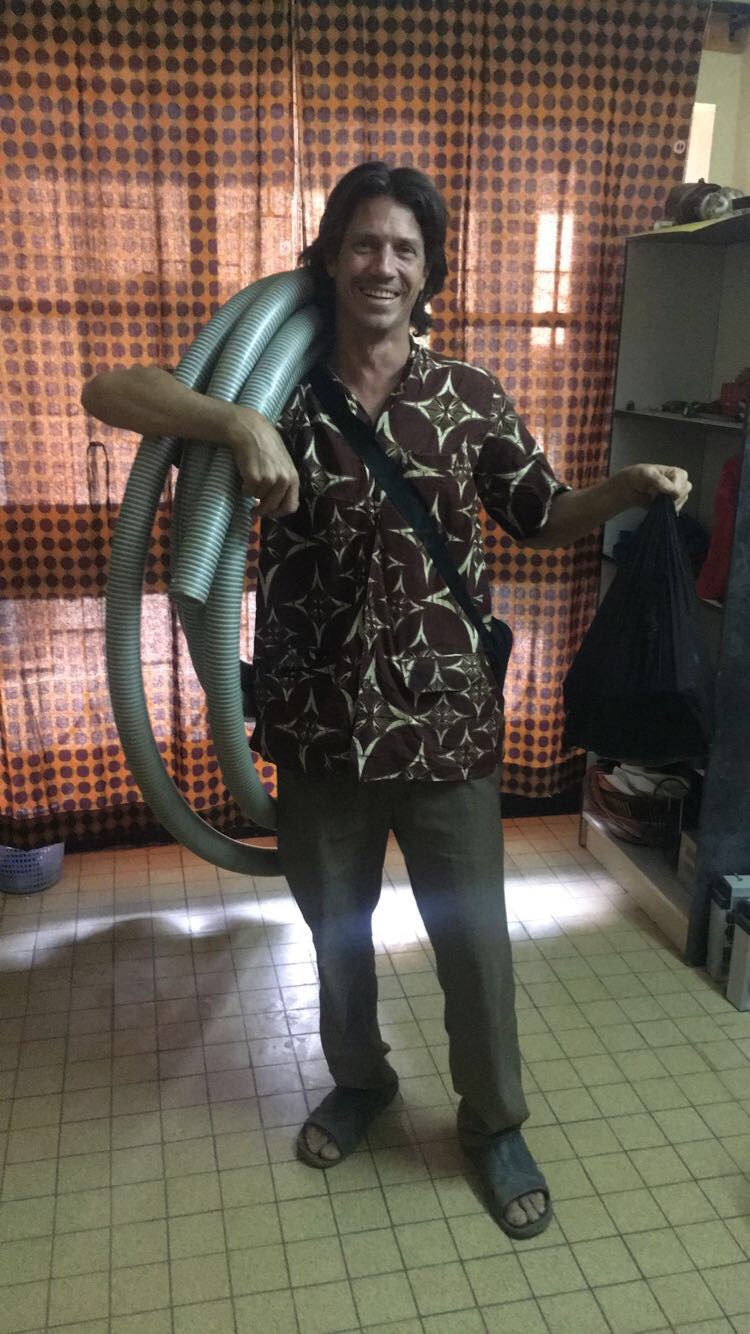
Lou Salome, RAIN Board of Directors
Brian, simply Brian, was how we at RAIN knew Brian Nowak. Only lately, too late, did I and others come to know Brian by his Fulani name Barke, which means “Blessed.” How smart others can be.
There was nothing simple about Brian, a man of many interests and much knowledge, all rooted in his love of humanity, his desire to learn and share his awareness and wisdom.
On his annual visits to Portsmouth to discuss Niger and RAIN’s work there, of which he was an essential part for many years, Brian usually chuckled as he answered questions. Brian’s chuckle was a way of clearing his throat before he answered in ways as clear as the water from RAIN’s wells that nourish the people of Niger.
His chuckle was but one part of Brian’s personality, a further reflection of his wide, honest smile and intimate knowledge. He chuckled about life, his work and the people he helped in West Africa, which he loved as one.
Brian could be described as a roads scholar, a forever student and a teacher wherever he ventured. His lust for learning stretched from anthropology to zoology. Brian had the look of a wanderer, a seeker, a humanitarian, all of which he embraced in his too-short but full life.
As a human being, Brian was at home anywhere. As an ambassador, Brian was America’s best.

